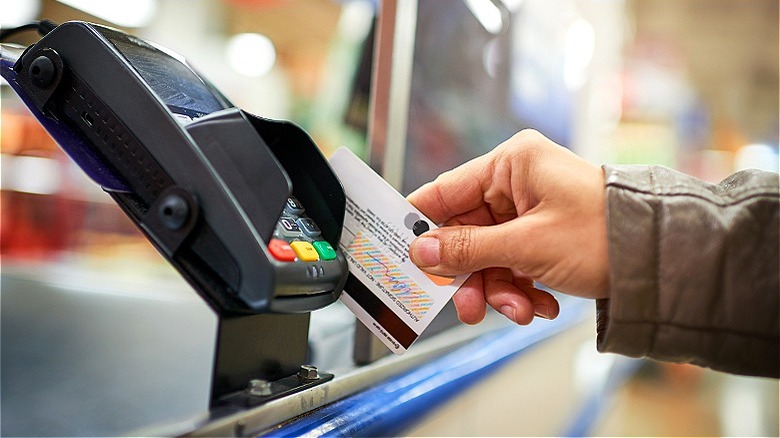Things You Should Never Pay For In Cash
You might be surprised to learn that, despite the growth of digital wallets and payment apps, cash is still the most commonly used form of payment in America. According to data from YouGov Profiles, 67% of people reported favoring cash over other transaction types. Given current interest rates, it's easy to understand why more people might be choosing to make their purchases with cash. This can be especially true for purchases like cars, where high associated loan interest rates could be hard to swallow.
Yet, while cash still might reign supreme for in-store purchases, it's important to realize just how much our shopping and spending habits have changed in the past few decades. According to the Pew Research Center, 41% of surveyed Americans reported being entirely cashless in a typical week. This was a noticeable jump from 2015 when just 24% of Americans reported the same. Payment apps are also becoming an increasingly popular choice for consumers to make their purchases with (especially when it comes to online shopping). However, while these offer convenience, many of the biggest payment apps offer few consumer protections in the event of fraud, making them no different than many cash purchases. (Learn why you shouldn't leave a large balance in your Venmo account.)
While the adage "cash is king" might still ring true for small businesses (and budgets), paying with cash isn't always your best choice as a consumer. From consumer protections to receipts to building your credit, there are many reasons why using a credit card for certain purchases could be the better long-term choice. Let's now dive into purchases you should never pay for in cash.
Cash purchases to avoid
Some of the most important purchases to avoid paying for in cash are business purchases. Not only does keeping a well-documented paper trail of business expenses ensure a smoother tax season, but it also ensures you're covered in the event of an IRS audit. Other purchases to consider avoiding cash for are travel purchases. While it can be helpful to get the local currency of wherever you're traveling to, relying entirely on cash while abroad can leave you more vulnerable to losing your money and/or even being pickpocketed. Since cash can't be replaced, you could find yourself in a sticky financial situation if you rely too heavily on cash for purchases. With that in mind, booking things like airfare and hotels via a credit card can also provide little-known travel perks, like miles and cash back, in addition to added consumer protection in case something goes wrong.
Speaking of protections, it's also never a good idea to pay for things like event or concert tickets in cash. Ensuring the tickets you want are authentic, and using a credit card with solid fraud protection policies, can ensure you don't find yourself getting duped. Another thing to consider is warranties. If you're looking to make a large electronic or appliance purchase, paying in cash might hurt you when it comes to the extended warranties. Depending on your credit card provider, you might find better extended warranty options for your purchase through your credit card than you would by paying with cash at the retailer.
Things to keep in mind
While always paying for certain things with a credit card can provide certain perks to you as a consumer, it's important to realize that the businesses you're purchasing from have to pay transaction fees as a result. According to the National Retail Federation, swipe fees are, on average, just over 2% of the transaction total; however, premium cards can cost retailers as much as 4%. (See Money Digest's overview on the dark truth behind credit card rewards.)
The Federal Reserve currently caps debit card fees at 21 cents (plus an additional 1 cent for fraud prevention and 0.05% of the transaction total for fraud loss recovery); it's proposed dropping the base fee to 14.4 cents. While this makes debit cards a better option for retailers than credit cards, it's still cutting into their transaction totals. The NRF estimates that credit and debit card fees cost retailers over $170 billion each year.
These swipe fees are then split several ways between the credit card company that processed the transaction, and the bank that issued the credit card itself. Retailers are increasingly pushing back on these fees by placing the burden on consumers. Chances are you've seen signs at the checkout area of some retailers about mandatory order minimums, or even about adding surcharge fees to purchases made with credit cards. While legal, a retailer can't charge you more than 4% of the transaction total. Despite the fact that 57% of credit cardholders think that additional surcharge fees for credit card processing should be illegal, only four states currently prohibit these fees.


